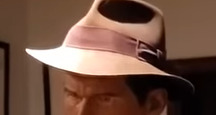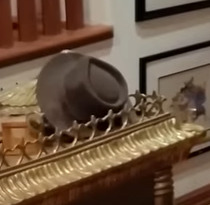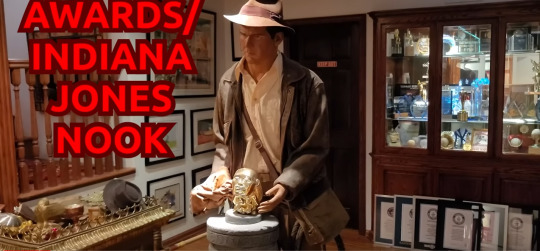#IN HONOR OF THE HOUSE SALE AND HIM PURGING HIS TREASURE ROOM;
Text
And now for something completely different. Here's a nice video about the art of sound editing, which starts off with a nice little intro regarding the Wilhelm scream; I'm sure you're all familiar.
youtube
JUST KIDDING.
This is a sad hat.

This is a different sad hat.

Courtesy, of. well.

Yeah, just watch the video.
#don't know if i feel proud or dismayed by all the props/collectibles i see there#HOWEVER can't judge too hard. i also have this problem in my house#just with. less funding.#this could go on a bad jackets list i suppose too. whip is hard to tell but looks questionable#idk. maybe a 4 plait?#indiana jones#hats#with all my sincerest apologies to ben burtt here#IN HONOR OF THE HOUSE SALE AND HIM PURGING HIS TREASURE ROOM;#I AM TAKING THIS OUT OF THE DRAFTS FOLDER#lmao
0 notes
Text
Pursuing Minimalism: 5 Lessons Learned
The decision to pursue a minimalist lifestyle became easy the moment I decided I could no longer bear the burden of attachment to material possessions - but I first had to realize that such a burden even existed. Although we are still early in our journey and have much to learn, I am amazed at the depth of self-discovery that has already occurred only a few days in. It’s as if all of this has been teeming just beneath the surface, waiting for the right moment to present itself before bursting forth like a fountain, unannounced and unstoppable. (What better time than only days before a comprehensive respiratory final exam.) I am certain there will be more than 5 lessons to come of this adventure, but these first 5 have been so important that I couldn’t risk waiting to write them down later. Here goes nothing:

1. Having more than I need might actually be a bad thing.
I have assumed for most of my life that having an excess of things fell somewhere between good and neutral, that you could certainly stand to benefit from having extra things but at worst it would have neither positive nor negative affect on your life. After significant reflection, I now think very differently. My thoughts are summarized as follows.
By having more than we needed, we allowed ourselves a false sense of security, thinking that having multiples of the same or similar things made us "prepared". All it really made us was unable to properly use any of the things we owned. Often this was because we had so many things, we forgot that we even owned some of them. They were simply collecting dust in the deepest recesses of our cupboards and drawers, taking up space and not contributing to our lives, often resulting in us buying a duplicate of something without even realizing it.
While this might be fairly harmless on its own, the reasons behind our "need" for excess were not.
Speaking for myself, I was motivated to keep certain things I didn't need out of fear and uncertainty, essentially enslaving myself to preparing for a future I wasn't even sure I would have, never living in the present. When I first decided to let go of those "just-in-case" possessions, I found myself face to face with a fear of the unknown that I didn't even realize I had, and the freedom that followed it’s absence.
I was motivated to keep other things out of guilt, as they had been gifts or something I had spent a great deal of money on, regardless of its usefulness or its ability to offer anything of lasting value to my life. Most of these things were packed away in boxes, following me from apartment to apartment never to be unpacked, simply taking up space and quietly causing me anxiety every time I was reminded of their existence. Finally letting some of these things go lifted a burden I did not realize I had been carrying until I finally set it down.
For other things, I was motivated to keep them in order to maintain some sort of status or reputation, enslaving myself to the approval of others. As soon as I decided such status was no longer important to me, about half of my possessions suddenly lost their value.
Still for other things, I simply couldn't part with them because of their sentimental value. I had convinced myself that giving up this object would mean giving up my memories of loved ones, when in fact there is nothing that can take those memories from me, object or no object. I ended up choosing to keep a small amount of such sentimental items - mostly books and toys from my childhood that I hope to give to my children someday - and the rest I made peace with and said goodbye.
The anxiety and emotion that accompanied the simple task of throwing away an old pair of shoes or and unused gift was enough to grab my attention. This is a problem, and it needs to be addressed.
2. Having less things means making less decisions about them.
Having 4 professional outfits to choose from instead of 24 means less time spent every morning deciding what to wear to work.
Having less dishes to use means actually washing them as you use them instead of simply grabbing another dish and letting them pile up in your sink.
Having less bottles of hair product on your shelf means less time fumbling through everything trying to find the only one you ever use anyways.
Having 2 musical instruments in the house instead of 5 means I'll spend less time worrying about which one I should practice (or spend so much time trying to decide that I give up all together and play none of them).
Having less stuff means I'm actually excited to use the few things I do have because I know that they bring value to my life. For the first time in my life, I honestly believe that less is more.
3. For a family of 2, we produce an impressive (embarrassing) amount of garbage.
In these few days of intense purging, we have walked at least 8-10 bags of un-recyclable trash out to our dumpster - not to mention the 8-10 bags worth of stuff still sitting on our living room floor waiting to find a home with either our friends and family or at Good Will.
Even before we began this process, we've struggled to keep up with recycling. We know that it is important, but since our apartment doesn't offer it, and we don't know where to go, (and it's one more thing for us to try to squeeze into our already overloaded schedules) it simply hasn't been a priority for us to figure it out outside of occasionally taking our returnables back to Meijer. But it's time to make a change.
Our stewardship of the earth as followers of Christ is supposed to be an important task, gifted to humans above all other creatures because we were made in the image of its Creator. Unfortunately, most of us simply choose not to treat the earth this way, as something that was entrusted to us but does not truly belong to us. In light of this conviction, I plan to start asking myself with EVERY purchase and waste-related decision, "Would a proper steward of the earth make this same choice?"
As overwhelming as this will feel at first, making small changes every month will go a long way towards forming habits that will better honor God and the earth he has placed in our care.
4. An impressive (and embarrassing) proportion of my belongings are the result of an impulse purchase.
After some thorough self-reflection, I realized that, for most of my life, shopping has been an outlet for my anxiety. Whether I took an unsupervised trip down the snack aisle after a bad day or hit up the clearance rack in the women's clothing section, purchasing things brought me a fleeting happiness and momentary distraction from my stress - bordering on an addiction. I'd find all sorts of ways to justify my decisions - "It's on sale", "I really want it", or my favorite "I deserve this". And for the number of times I did it you'd think I'd have remembered the "fleeting" part and found some other more permanent solution, but for whatever reason I knowingly continued to pursue an empty well.
What hasn't been fleeting is the relief and freedom I have consistently found in giving my things away to others. Where my purchases added to the clutter that ultimately worsened my anxiety, giving them away removed the clutter and my anxiety followed suit.
Taking intentional steps to significantly reduce our number of possessions has done more for my mental health than just about anything else I've tried. I wish I could succinctly describe the peace (and weirdly the thrill) I have found in letting go of things I thought I'd keep indefinitely, and the spiritual parallels I am discovering as my walk with Christ is also "decluttered".
5. This shift in focus is not a phase, but rather something that has been quietly stirring, not making itself fully known until now.
Elements of minimalism have been making their way into my life ever since I gave my life to Christ 7 years ago. The story of the rich man has always been a convicting read, hearing about a young man who was so attached to and in love with his material possessions that he was unwilling to part ways with them in order to follow Jesus, Himself being the greatest gift mankind would ever receive. Easier it is for the camel to pass through the eye of a needle than for a rich man to enter the kingdom of Heaven, Jesus said - not because God loves the rich young man any less than the next guy, but because the young man loved his stuff more than he loved God. His bondage to his valued possessions blinded him to the surpassing worth found in knowing Jesus. He allowed the temporary to take precedence over the eternal.
I do not think this passage of scripture implies that owning material possessions is evil. Owning things is a necessary fact of life on earth. But enslaving ourselves to them is not. And the more we own, the more we commit ourselves to a given standard of living, the more we stand to lose - and the harder it is to let it go.
Taking these teachings to heart requires asking ourselves some hard questions, and the end result will look differently for different people, but I can tell you that it has been one of the most rewarding and important things I have ever done. Might I challenge you, reader, to ask yourself the same thing: Where is your treasure?
0 notes